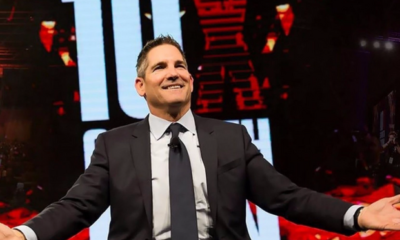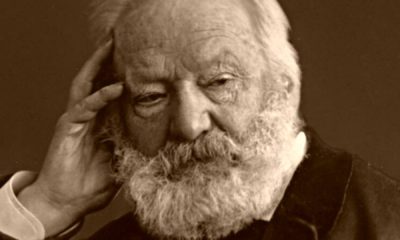Success Advice
How To Become A Millionaire Author

Writing a book is one of those experiences where simply just creating your own book is a reward in itself. But there is nothing wrong with wanting to be a major success either. We always hear breakthrough stories about authors like Stephen King, Nicholas Sparks, Stephenie Meyer, or J.K. Rowling who become overnight successes and very wealthy.
If you want to become a successful author then here are some steps that must be taken in order to achieve that goal. Keep in mind that the road to mainstream success is a varied one, but these principles should apply to every writer who wants success.
The Steps Of A Successful Author
The first thing you need to know is that you MUST hone your craft. You wouldn’t try to sell paintings if the only thing you know how to draw is a stick figure would you? Writing is an art just like any other, so you need to develop your craft as much as possible. This means experimenting with different writing styles, figuring out how you approach subject matter, and most importantly developing your professional tone. A mastery of the language you write in is vital. It is only when you know the rules of language that you can break them.
While mastering your craft it is also a good idea to find the best audience that fits your genre and begin to build a following. Publishing has changed a lot over the past ten years with the internet becoming an increasingly viable (and often necessary) means of gaining success. Using online writing sites where users give feedback will not only help you build up readers, but it will give you an idea of what readers are looking for.
One of the keys to becoming a successful author is finding the right balance between meeting commercial imperatives without compromising your vision as an author. After all, success is not worth much if you think of yourself as a sell-out. You need to remember that no author gains success by playing it safe.
J.K. Rowling is a prime example of an author who gives her fans what they want while sticking to her creative guns and throwing in great twists that readers did not see coming. Remember that you attain success and fans as a result of your creativity. On the other side of that coin it cannot hurt to know what your audience wants, so long as you do not fall into the trap of constant fan service. It may seem to be a situation where you are trying to have your cake and eat it as well, but it is a balance that every author must work towards striking.
Developing the ability to write quickly is also vital. While it is most important to get your book right as you writing it, when you are trying to get it published time is of the essence, especially if you have a book deal. Learning to write under the pressure of a deadline will also help to make you a more productive writer, and if you can write quickly as well as write well then you are more desirable to publishers and worth their investment in you.
One of the most difficult steps to becoming a successful author is actually getting your book published. There are several steps you can take to become published, but none of them are exactly easy. E-books are becoming increasingly popular, but because of the lack of expense that goes into them the market is heavily saturated. Another form is self publication, this takes a little bit of cash initially but a number of authors have proven that this method is becoming more of a promising option.
Another option that many find helpful is to submit your work to a publishing house. You could even find an agent to do this for you, there are plenty agents out there, if you have the quality and they believe in you then they will get your work to the right publishing house for you. Just know that this process can be a little longer and you may find it frustrating. Don’t be discouraged if you receive a rejection letter as there are many authors who wrote best selling works that were turned down multiple times before finally landing a book deal.
NY Times best selling author Robert Kiyosaki, the author of ‘Rich Dad, Poor Dad’ had his ‘Rich Dad, Poor Dad’ book turned down by every publisher he approached and Barnes & Noble refused to stock his work initially. He decided to self publish the book and has sold over 26 million copies. This goes to show that you CAN make it happen by yourself, if you have quality work then others with promotional power ie.. Celebrities, Talk Shows, Radio Shows etc… Will spread the word of your amazing book which should in turn give you the leverage needed to move units.
Just remember, if you don’t self publish and you are going through a publishing house, be careful not to give away all your rights in your rush to get published. Take your publishing contract to an experienced lawyer who can explain all the terms before you decide to sign.
While being a well known author may seem like it should be easy enough once the big bucks are rolling in you need to keep in mind that fame won’t last without a solid building block to hold it up. The last thing you want to be is an author that is huge one day and gone the next. Whether you reach this stability through multiple sequels or through a just one timeless work of art it is completely up to you so long as you do eventually reach it in the end.
Checkout our article The Top 10 List Of The Highest Paid Authors to see how much a successful author really makes.
Article By: Coty Ellis | Addicted2Success.com
Business
The Simple Security Stack Every Online Business Needs
Most small businesses are exposed online without realising it. This simple protection stack keeps costs low and risks lower.

Running a business online brings speed and reach, but it also brings risk. Data moves fast. Payments travel across borders. Teams log in from homes, cafés, and airports. (more…)
Business
If Your Business Internet Keeps Letting You Down, Read This
From smoother operations to better security, dedicated internet access is quietly powering today’s high-performing businesses.

Today, a dependable internet service is the bedrock for uninterrupted business operations. Many organizations rely on stable online connections for communication, data transfer, and customer interaction. (more…)
Did You Know
How Skilled Migrants Are Building Successful Careers After Moving Countries
Behind every successful skilled migrant career is a mix of resilience, strategy, and navigating systems built for locals.

Moving to a new country for work is exciting, but it can also be unnerving. Skilled migrants leave behind familiar systems, networks, and support to pursue better job opportunities and a better future for their families. (more…)
-

 Health & Fitness2 weeks ago
Health & Fitness2 weeks agoWhat Minimalism Actually Means for Your Wellness Choices
-

 News1 week ago
News1 week agoBrandon Willington Builds 7-Figure Business by Ignoring Almost Everything
-

 Did You Know2 weeks ago
Did You Know2 weeks agoWhy Most Online Courses Fail and How to Fix Them
-

 Business2 weeks ago
Business2 weeks agoIf Your Business Internet Keeps Letting You Down, Read This
-

 Business2 days ago
Business2 days agoEntrepreneur’s Guide to Pay Stubs: Why Freelancers and Small Business Owners Need a Smart Generator
-

 Finances3 hours ago
Finances3 hours agoWhy Financial Stress Is One of the Biggest Barriers to Personal Growth
-

 Business52 minutes ago
Business52 minutes agoThe Simple Security Stack Every Online Business Needs


























9 Comments